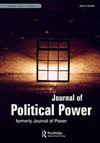Tales of power
IF 1.3
Q1 POLITICAL SCIENCE
引用次数: 1
Abstract
ABSTRACT In the form of an interview between two colleagues, this paper explores 50 years of power theorizing by Stewart Clegg, from his early doctoral days to the present day. The origins of his approach to power in a combination of structuralism, Wittgenstein and ethnomethodology are explored. The background to his early work, whose empirics were based on the analysis of conversational materials, are outlined, as well as how it became a publication. The rationale and context of subsequent significant contributions to the power debate are engaged. Elsewhere, the power debate had moved from Lukes’ three dimensions of power to four dimensions, the provenance of which is critically evaluated. In order to exemplify the practical implications of these theoretical reflections, the conversation goes on to address some current issues associated with the coronavirus pandemic and the relations between democracy and elites.权力的故事
本文以两位同事访谈的形式,探讨了斯图尔特·克莱格从早期博士时代到现在50年来的权力理论。在结构主义、维特根斯坦和民族方法学的结合中,探讨了他的权力方法的起源。他的早期工作的背景,他的经验是基于对对话材料的分析,概述,以及它是如何成为出版物。随后对权力辩论的重大贡献的基本原理和背景进行了探讨。在其他地方,关于权力的争论已经从卢克的权力的三个维度转移到四个维度,其来源被批判性地评估。为了举例说明这些理论反思的实际意义,对话继续讨论与冠状病毒大流行以及民主与精英之间关系相关的一些当前问题。
本文章由计算机程序翻译,如有差异,请以英文原文为准。
求助全文
约1分钟内获得全文
求助全文

 求助内容:
求助内容: 应助结果提醒方式:
应助结果提醒方式:


